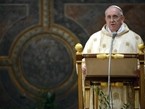In an interview Sunday, Pope Francis weighed in on a recent Pew Research Center study documenting the shift of many Latin Americans away from the Catholic Church and toward Pentecostal Protestant churches.
The study showed that despite the “Francis Factor,” the number of Catholics in Latin America has been in steady decline, while Protestantism has been growing exponentially, doubling its numbers in just a generation.
When asked about the study, Pope Francis said he was aware of the statistics, and suggested that multiple external factors were undoubtedly at play. The Pope specifically mentioned only one of these factors, however, the so-called “Prosperity Gospel,” which, he said, “has given rise to many religious offerings that people find attractive.”
Francis went on to suggest that this proposal is ultimately unsatisfying and that those who chase after it “only go half way.”
The journal Christianity Today defines the Prosperity Gospel as “an aberrant theology that teaches God rewards faith–and hefty tithing–with financial blessings.” In other words, following Christ brings substantial monetary rewards. This idea “was closely associated with prominent 1980s televangelists Jimmy Swaggart and Jim and Tammy Bakker, and is part and parcel of many of today’s charismatic movements in the Global South,” the journal states.
Prosperity Theology has been very popular in poor countries where desperation seems to lead people to find consolation in the idea that God rewards his faithful with cash benefits. In Nigeria, for example, Pastor Michael Okonkwo has been remarkably successful with his message that God wants his children to be wealthy. Presiding over a conference of 150 prosperity-oriented churches, Okonkwo says that “many are ignorant of the fact that God has already made provision for his children to be wealthy here on earth. When I say wealthy, I mean very, very rich. … Break loose! It is not a sin to desire to be wealthy.”
Pope Francis has taken the opposite approach, embracing a “preferential option for the poor” and famously saying, “I want a Church which is poor and for the poor.”
In Sunday’s interview, Pope Francis also explored internal factors for Catholics leaving the Church in Latin America. “I ask myself,” he said, “what are the things that we do, within the Church, that makes the faithful feel dissatisfied?” Francis’ answer is that “people don’t feel we are close enough, it’s clericalism,” he said.
“Today,” Francis continued, “this closeness calls Catholics to go out and become neighbors to people, to sympathize with their problems and their reality.”
According to the Pew Center study, those who left the Catholic Church cited varied motives for doing so. A large majority said they were “seeking a personal connection with God” or “wanted a greater emphasis on morality.” Some 14% said they were “seeking a better financial future.”
Follow Thomas D. Williams on Twitter @tdwilliamsrome

COMMENTS
Please let us know if you're having issues with commenting.